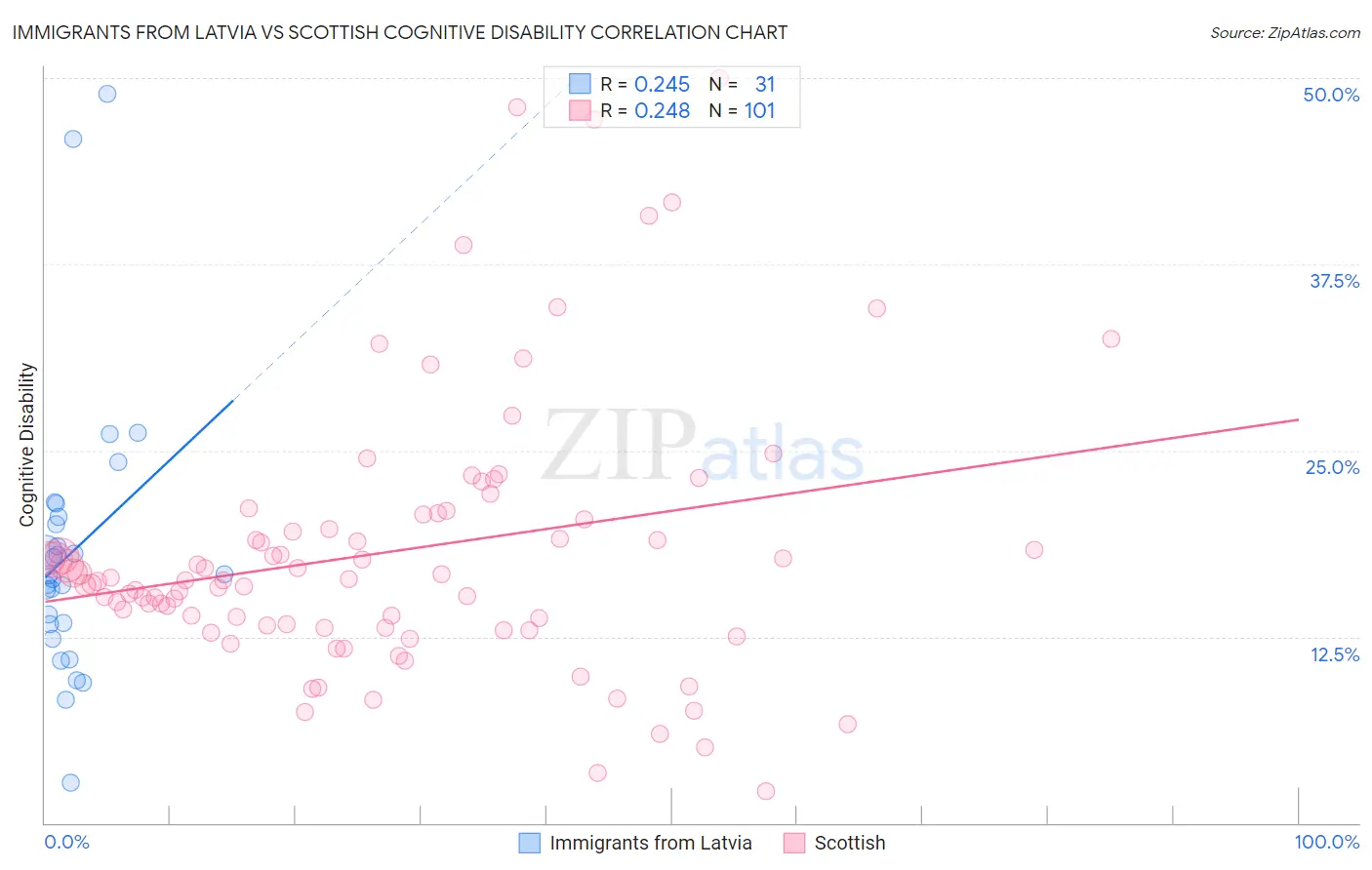Immigrants from Latvia vs Scottish Cognitive Disability
COMPARE
Immigrants from Latvia
Scottish
Cognitive Disability
Cognitive Disability Comparison
Immigrants from Latvia
Scottish
17.2%
COGNITIVE DISABILITY
73.2/ 100
METRIC RATING
159th/ 347
METRIC RANK
16.9%
COGNITIVE DISABILITY
95.0/ 100
METRIC RATING
120th/ 347
METRIC RANK
Immigrants from Latvia vs Scottish Cognitive Disability Correlation Chart
The statistical analysis conducted on geographies consisting of 113,738,689 people shows a weak positive correlation between the proportion of Immigrants from Latvia and percentage of population with cognitive disability in the United States with a correlation coefficient (R) of 0.245 and weighted average of 17.2%. Similarly, the statistical analysis conducted on geographies consisting of 566,987,666 people shows a weak positive correlation between the proportion of Scottish and percentage of population with cognitive disability in the United States with a correlation coefficient (R) of 0.248 and weighted average of 16.9%, a difference of 1.4%.

Cognitive Disability Correlation Summary
| Measurement | Immigrants from Latvia | Scottish |
| Minimum | 2.7% | 2.1% |
| Maximum | 49.0% | 50.0% |
| Range | 46.2% | 47.9% |
| Mean | 18.2% | 18.2% |
| Median | 16.7% | 16.3% |
| Interquartile 25% (IQ1) | 13.4% | 13.2% |
| Interquartile 75% (IQ3) | 20.5% | 20.5% |
| Interquartile Range (IQR) | 7.2% | 7.3% |
| Standard Deviation (Sample) | 9.4% | 9.1% |
| Standard Deviation (Population) | 9.2% | 9.0% |
Similar Demographics by Cognitive Disability
Demographics Similar to Immigrants from Latvia by Cognitive Disability
In terms of cognitive disability, the demographic groups most similar to Immigrants from Latvia are Celtic (17.1%, a difference of 0.030%), Australian (17.2%, a difference of 0.030%), American (17.2%, a difference of 0.040%), Yugoslavian (17.2%, a difference of 0.060%), and Immigrants from Switzerland (17.2%, a difference of 0.060%).
| Demographics | Rating | Rank | Cognitive Disability |
| Immigrants | Indonesia | 82.7 /100 | #152 | Excellent 17.1% |
| Immigrants | Kazakhstan | 80.5 /100 | #153 | Excellent 17.1% |
| Immigrants | Malaysia | 79.3 /100 | #154 | Good 17.1% |
| Brazilians | 78.9 /100 | #155 | Good 17.1% |
| Sri Lankans | 78.9 /100 | #156 | Good 17.1% |
| Immigrants | Australia | 76.0 /100 | #157 | Good 17.1% |
| Celtics | 74.1 /100 | #158 | Good 17.1% |
| Immigrants | Latvia | 73.2 /100 | #159 | Good 17.2% |
| Australians | 72.4 /100 | #160 | Good 17.2% |
| Americans | 72.2 /100 | #161 | Good 17.2% |
| Yugoslavians | 71.6 /100 | #162 | Good 17.2% |
| Immigrants | Switzerland | 71.5 /100 | #163 | Good 17.2% |
| Armenians | 70.1 /100 | #164 | Good 17.2% |
| Immigrants | Albania | 64.9 /100 | #165 | Good 17.2% |
| Immigrants | Ecuador | 64.4 /100 | #166 | Good 17.2% |
Demographics Similar to Scottish by Cognitive Disability
In terms of cognitive disability, the demographic groups most similar to Scottish are Immigrants from China (16.9%, a difference of 0.020%), Immigrants from Western Europe (16.9%, a difference of 0.030%), Portuguese (16.9%, a difference of 0.040%), Turkish (16.9%, a difference of 0.070%), and South African (16.9%, a difference of 0.080%).
| Demographics | Rating | Rank | Cognitive Disability |
| Immigrants | Sri Lanka | 97.1 /100 | #113 | Exceptional 16.8% |
| Koreans | 97.1 /100 | #114 | Exceptional 16.8% |
| Yup'ik | 96.9 /100 | #115 | Exceptional 16.9% |
| Inupiat | 96.5 /100 | #116 | Exceptional 16.9% |
| Immigrants | Japan | 96.2 /100 | #117 | Exceptional 16.9% |
| Immigrants | Denmark | 96.2 /100 | #118 | Exceptional 16.9% |
| South Africans | 95.5 /100 | #119 | Exceptional 16.9% |
| Scottish | 95.0 /100 | #120 | Exceptional 16.9% |
| Immigrants | China | 94.9 /100 | #121 | Exceptional 16.9% |
| Immigrants | Western Europe | 94.8 /100 | #122 | Exceptional 16.9% |
| Portuguese | 94.7 /100 | #123 | Exceptional 16.9% |
| Turks | 94.5 /100 | #124 | Exceptional 16.9% |
| Scandinavians | 94.1 /100 | #125 | Exceptional 16.9% |
| Europeans | 93.4 /100 | #126 | Exceptional 17.0% |
| Immigrants | Costa Rica | 93.1 /100 | #127 | Exceptional 17.0% |